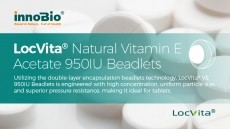BASF confirms B2 food grade price increase
for food products, three days after it announced similar measures
for the same vitamin intended for animal feed.
Effective immediately, the German chemical group said that worldwide prices for vitamin B2 are going up by around 20 per cent, but the precise increase depends on the grade of product.
A spokesperson told NutraIngredients.com earlier this week the costs of raw materials used in the fermentation production process for vitamin B2 has increased significantly over a sustained period of time. Marketing costs are also said to be a factor in the price increases.
Today's announcement follows the news on Tuesday that the cost of the animal-grade vitamin is now $20.50/kg (€16.40/kg) on a CIF sea basis. The spokesperson told NutraIngredients.com at that time that since both the food and feed-grade vitamin are produced by the same fermentation process, B2 intended for human consumption - be it through mainstream foods or dietary supplements - was also likely to be impacted.
For humans, vitamin B2 (also known as riboflavin) is a vital nutrient that plays a role in energy production, production of red blood cells, antibody production, regulation of thyroid activity, and other functions.
Since it is water soluble, B2 cannot be stored by the body, which means that resources must be replenished each day. Food sources include organ meats, milk, yeast, cheese, oily fish, eggs and dark green leafy vegetables. It is an ingredient in a wide range of supplement products and fortified foods, including breakfast cereals.
BASF also recently announced an 11 per cent increase in the cost of its feed grade vitamin E due to raw material costs - again with food grade increases likely to follow. However it is understood that there is no connection between the raw materials required for B2 and for vitamin E.
When reporting its Q2 results in August, BASF said that, in general, record raw material costs have increased pressure on margins and that price increases to reflect rising costs will be necessary in the future.
The Fine Chemicals division manufactures vitamins, carotenoids, enzymes and organic acids, active pharmaceutical ingredients and intermediates, aroma chemicals, polymers and UV filters. In 2005 it posted sales of € 1.73 billion.













